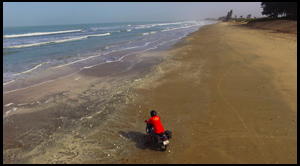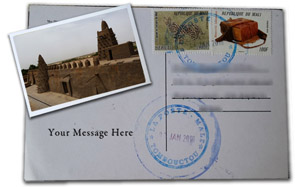A lot of people have asked me if we chose our travel dates in order to avoid Mali’s presidential election scheduled for July 29th. The answer is no. I am not worried about my personal safety nor am I worried about widespread violence, at least not in Bamako.
Some would say that’s naive. A team of TV5 journalists was violently accosted at the airport on Sunday. That same night, unidentified gunmen attacked a delegation belonging to Aliou Diallo, one of the candidates. And over the weekend, the chief opposition party brought forth evidence of serious electoral fraud.
There are two different electoral rolls, and one of them has a surplus of 1.2 million voters. Some of the voters are duplicates, some are fictitious. There are discrepancies all over the map. Here is a voter born in 1949 who looks like he is about 15 (follow @zirasun for more of these).
l’Organisation internationale de la Francophonie (OIF), the organization that audited the original – and presumably correct – electoral roll is now rushing a team to Bamako to try and get to the bottom of it. All of the voter cards were printed in France (a subject for another post), and no one seems to know whether the fictitious voter roll or the real one were sent to the print shop. The government is chalking it up to a “technical error,” and they are insisting that the correct cards were printed. All of this a week out from the election.
I recommend reading Bruce Whitehouse’s latest post. He makes three grim predictions – and that was before the allegations of electoral fraud surfaced! – and I mostly agree with him.
The first prediction is that voter turnout will be atrocious. I agree. Voter turnout has never reached 50% in Mali, and it’s often much lower. In 2013, it hit a high of 45%, when the population overwhelmingly supported IBK. This year, the vote will once again be held in July, when rural populations are tending to their fields. Bruce also rightly points out that the level of violence in the center and north will further depress turnout.
On top of all that, there is no candidate that has mobilized the population like IBK did in 2013. IBK is once again up for election, but he has long squandered his political capital. His flat-footed, visionless and incompetent government has overseen five years of worsening corruption, insecurity and impunity. A new interchange on the Segou highway is not going to help people forget that the state is absent in much of the country, and in places where it is present, it can’t deliver on basic social services.
Bruce’s second prediction is that IBK will win. IBK doesn’t have the political capital he had in 2013, but he has the biggest war chest, and as Bruce points out, he controls state media and has access to important patronage networks. The chief opposition candidate, Soumaila Cisse, has put together a large coalition, and he has racked up some crucial endorsements, including that of the still influential Ras Bath. But he’s still tied to the old political class and all of the baggage that comes with it.
If you would have asked me a year ago if IBK would be reelected, I would have said there’s not a chance. But with a fractured, apathetic electorate, and IBK spraying money around, co-opting whoever he can, I don’t know anymore. I don’t think IBK can win in the first round. If it goes to a second round, it will most likely be a repeat of 2013 – IBK vs. Soumaila Cisse. In that case, both candidates will aggressively pursue the votes of the eliminated parties. Money will flow, promises will be made.
I don’t know who will win. I’m not as confident as Bruce, who brought up the possibility of a first round victory. Then again, if IBK is bagging an extra 1.2 million imaginary votes, game over.
I unfortunately agree with Bruce’s third prediction, which is that the election might not matter anyway. I wrote this in 2013, as we were working on the SOS Democracy project. I was seriously optimistic about Mali’s future. Five years later, Mali’s deep systemic problems have only gotten worse. Even more troubling, the normally strong social fabric of Mali – the only thing holding things together in many places – has been absolutely shredded in some parts of the country.
I do find it encouraging that despite the current situation, there are still citizens like Coumba Bah, the founder and relentless leader of SOS Democracy in 2013, who continue to labor for Mali’s future. Their efforts can’t be overstated, but damn, it’s a steep hill to climb and the last five years have only made it more difficult.
In other news
Bintou, Andre and I are off to the states tonight. Our friends Kevin and Heike will be running the hostel. Ali will oversee the Postcards from Timbuktu project. Speaking of which, we recently added a new item to the site, custom calligraphy from Boubacar Sadeck, Timbuktu’s last master calligrapher. Here’s a video of him working on an order. If you are interested in getting one for yourself, you can do so here.
See you in the states or back in Mali in a few weeks!




0 Comments